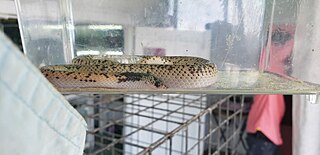
The International Union for Conservation of Nature (IUCN) Red List of Threatened Species, also known as the IUCN Red List or Red Data Book, founded in 1964, is an inventory of the global conservation status and extinction risk of biological species. A series of Regional Red Lists, which assess the risk of extinction to species within a political management unit, are also produced by countries and organizations.
Snakewood is a common name of several different plants:

An IUCN Red List Critically Endangered species is one that has been categorized by the International Union for Conservation of Nature as facing an extremely high risk of extinction in the wild. As of December 2023, of the 157,190 species currently on the IUCN Red List, 9,760 of those are listed as Critically Endangered, with 1,302 being possibly extinct and 67 possibly extinct in the wild.

A species that is extinct in the wild (EW) is one that has been categorized by the International Union for Conservation of Nature as only consisting of living members kept in captivity or as a naturalized population outside its historic range. Classification requires exhaustive surveys conducted within the species' known habitat with consideration given to seasonality, time of day, and life cycle. Once a species is classified as EW, the only way for it to be downgraded is through reintroduction.
The Caroaebe River is a river of Roraima state in northern Brazil, near the equator.

Loxopholis is a genus of lizards in the family Gymnophthalmidae. The genus is endemic to South America.
Loxopholis caparensis is a species of lizard in the family Gymnophthalmidae. It is found in Venezuela and Colombia.
Loxopholis ferreirai is a species of lizard in the family Gymnophthalmidae. The species is endemic to Brazil.
Loxopholis hexalepis, the six-scaled tegu, is a species of lizard in the family Gymnophthalmidae. It is found in Venezuela and Colombia.
Loxopholis ioanna is a species of lizard in the family Gymnophthalmidae. It is endemic to Colombia.
Loxopholis osvaldoi is a species of lizard in the family Gymnophthalmidae. The species is endemic to Brazil.
Loxopholis percarinatum, Müller's tegu, is a species of lizard in the family Gymnophthalmidae. It is found in Guyana, Suriname, French Guiana, Venezuela, Colombia, Brazil, and Bolivia.
Loxopholis snethlageae is a species of lizard in the family Gymnophthalmidae. The species is endemic to Brazil.

Phimophis guianensis, also known commonly as Troschel's pampas snake, is a species of snake in the subfamily Dipsadinae of the family Colubridae. The species is endemic to South America.

Brosimum guianense, called snakewood, letterwood, leopardwood, and amourette, is a species of flowering plant in the genus Brosimum, native to southern Mexico, Central America, Trinidad, and tropical South America. A tree reaching 40 m (130 ft), its heartwood can command a price of $30 per kg.

Dialium guianense is a species of tree in the flowering plant family Fabaceae. The species occurs through North America, Central America and South America, and was an important source of food and wood for the ancient Mayans.
Hypoptopoma guianense is a species of catfish in the family Loricariidae. It is known from the Essequibo and Nickerie drainages in northern South America. It reaches 6.4 cm SL. The specific epithet of this fish derives from its presence in Guyana.






